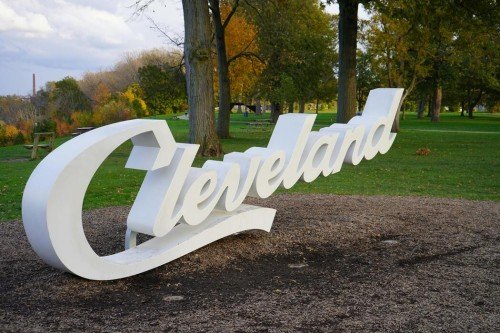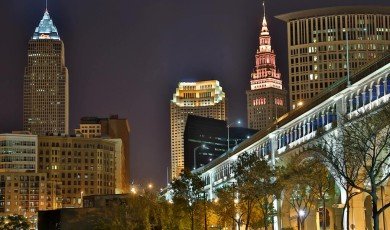
Cleveland holds a special place in the history of music. While Memphis, Detroit, and New Orleans each claim a role in shaping sound, it was Cleveland where the term “rock and roll” first found its name and identity. In the 1950s, local disc jockey Alan Freed began using the phrase on his radio shows, sparking a cultural revolution. This moment didn’t just change music, it put Cleveland on the map as a place where art could break boundaries. The city quickly became a hub for live performances, record launches, and fan-driven culture. From smoky clubs to packed arenas, Cleveland has always been more than a backdrop, it has been a stage where music history is made.
The Rock & Roll Hall of Fame
Perhaps the most visible symbol of Cleveland’s musical legacy is the Rock & Roll Hall of Fame. Since its opening in 1995, this iconic glass pyramid on the Lake Erie shoreline has welcomed millions of visitors from around the world. More than just a museum, it is a living tribute to the artists, innovators, and cultural movements that defined generations. Each year, induction ceremonies bring international attention, reminding the world that Cleveland still holds a central role in music’s story. These events also fuel tourism, generate millions in economic activity, and solidify Cleveland’s place as a cultural powerhouse.
Music and the City’s Identity
For Clevelanders, rock and roll is more than nostalgia, it’s part of the city’s DNA. The resilience, creativity, and rebellious spirit of the genre reflect the community itself. Just as the city survived industrial decline and economic hardship, rock music often tells stories of struggle, survival, and reinvention. Neighborhoods like Tremont, Ohio City, and Waterloo Arts District now buzz with local venues, indie bands, and grassroots festivals. From emerging artists playing in dive bars to international acts filling stadiums, the city’s music culture remains vibrant, diverse, and deeply authentic.
The Digital Era and Music Promotion
In today’s world, music doesn’t spread only through radio or live shows, it thrives online. Digital marketing has become essential for artists and venues hoping to reach global audiences. Social media, streaming platforms, and content marketing have changed the way fans discover new music. Here, strategies like off-page seo play an interesting role. Just as a band needs promotion outside its home stage, websites benefit from visibility beyond their own content. Backlinks from music blogs, media reviews, and cultural platforms are like “shout-outs” in the digital world, building authority and expanding reach. For Cleveland’s venues and festivals, mastering these strategies ensures that their reputation extends far beyond the city limits, keeping its music scene alive in global conversations.
Festivals and Live Performances
Cleveland continues to thrive as a live music city. Festivals like the Cleveland International Film Festival and Brite Winter include strong musical components, while summer concerts on the waterfront bring together crowds of all ages. Small venues, too, play an essential role. Places like the Beachland Ballroom or Grog Shop provide platforms for rising talent, ensuring that the spirit of discovery never fades. These intimate spaces keep the tradition alive: audiences connecting with artists before they become household names.
A Cultural and Economic Driver
Music in Cleveland is not just about entertainment, it’s a key driver of economic and cultural development. The industry generates jobs in tourism, hospitality, media, and event management. More importantly, it strengthens community identity and attracts young creatives who want to be part of a city where culture matters. The Rock & Roll Hall of Fame alone has pumped billions into the local economy since opening. Combined with local events and venues, music remains one of the city’s most powerful exports.
A Diverse Soundtrack
While rock and roll is the headline, Cleveland’s music scene goes far beyond. Jazz, hip-hop, classical, and electronic music all thrive here. The Cleveland Orchestra, often ranked among the world’s best, brings international prestige, while underground rap battles and electronic festivals showcase the city’s dynamic range. This diversity shows that Cleveland isn’t frozen in the past. It honors its rock legacy while embracing new sounds, making it a city of both tradition and innovation.
Looking to the Future
Cleveland’s bond with music remains unshakable. As technology changes how people create and consume art, the city adapts. From streaming collaborations to virtual concerts, Cleveland’s institutions and artists are finding ways to keep audiences engaged worldwide. With a strong foundation in history, a thriving live scene, and smart digital strategies like off-page seo, Cleveland’s music culture is set to remain relevant for decades. The story is no longer just about being the birthplace of rock and roll—it’s about being a living, breathing city where music continues to evolve and inspire.
The Beat Goes On
Cleveland has proven that music is more than sound, it’s identity, resilience, and connection. Whether through the legacy of Alan Freed, the glass walls of the Rock Hall, or the energy of local bands on a Friday night, the beat of the city is loud and clear. Rock and roll may have started here, but its echoes continue to travel the world, reminding us why Cleveland still owns the stage.
Most Read
Featured Posts







